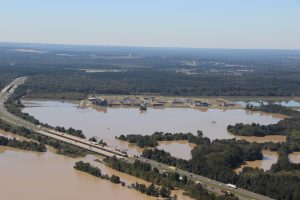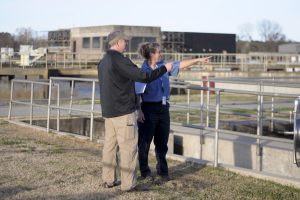Global S&T Development Trend Analysis Platform of Resources and Environment
| Columbia, S.C.’s atypical apprenticeship program is working, and here’s proof | |
| admin | |
| 2019-05-14 | |
| 发布年 | 2019 |
| 语种 | 英语 |
| 国家 | 国际 |
| 领域 | 资源环境 |
| 正文(英文) | When it rains, it doesn’t always pour — at least not at the City of Columbia (S.C.) Metropolitan Wastewater Treatment Plant. Even after a historic 1,000-year flood in 2015 and the wettest December on record 3 years later, the 227-ML/d (60-mgd) facility remained well within its regulatory limits every day, according to superintendent David Wiman.  During the historic 1,000-year flood in 2015, Columbia Water treated sustained flows that were 25% to 30% above design capacity every single day, while keeping effluent within regulatory limits. Photo courtesy of Missy Gentry/Columbia Water. “During these periods, we were treating sustained flows that were 25% to 30% above design capacity every single day,” Wiman said. Wiman is proud of this accomplishment, but he is even prouder of the high-performing facility operators who made it possible. Their successes, he said, are due in no small part to the education and training many received through the not-quite-typical operator apprenticeship program Columbia Water created in 2012. A second program for maintenance staff kicked off in 2017. Real-world learning for real-world resultsBoth programs are designed to meet a simple goal: build a self-sufficient workforce from people who may have little or no experience, but display initiative, a strong work ethic, and a desire to learn. “Typically, new operators are taught routines,” Wiman explained. “Learning the big picture may never come, or at the very least, it will be learned the hard way, through mistakes and plant upsets.” Instead of focusing on routines, Columbia Water works instead to build big-picture thinkers by creating strong mentoring relationships, rotating apprentice operators throughout different parts of the facility, and training them to perform each task that keeps the treatment process moving.  At Columbia Water shift change meetings, where apprentices are exposed to high level decision-making, as the outgoing shift updates incoming staff on current issues impacting facility operations. Photo courtesy of Sarah Hickman/Columbia Water. The goal, Wiman said, is to prepare them to respond confidently and decisively to challenging situations as “an expectation of their workplace culture.” When faced with a storm or other upset, “front-line workers must be able to react first and then communicate” to supervisors, Wiman said. “That communication … should go something like, ‘This happened. I contained the issue, identified the cause, and made these adjustments.’” While a supervisor may make suggestions, Wiman explained, “we will never allow an event to continue unabated while someone waits to be told what to do.” Testing competencyOf 48 operator apprentices enrolled since the program’s rollout in 2012, 46 have completed it. Obtaining certification requires not only passing competency exams, but also completing a competency walk-through with Wiman. ‘The walk-through loosely simulates a regulatory inspection,” he explained. Trainees receiving the lowest-grade certifications are asked what they would check during inspection rounds, while those seeking higher clearances are asked how they would respond to specific situations and facility conditions.  Operator apprentices at Columbia Water complete walk-through practicals as part of their training and evaluation. Photo courtesy of Hickman. Columbia Water’s “big picture” approach appears to be working. “I have operators with less than a year’s worth of experience that are farther along the learning curve than I was after my first 6 years,” Wiman said. Their expertise is demonstrated in the 20 awards the utility has earned during the past 7 years, including the inaugural Water Environment Federation (Alexandria, Va.) Water Heroes award. Columbia Water also fielded the first all-female Operations Challenge team at WEFTEC® 2018. Also of note: the city’s water effluent quality is on the rise. As the apprentice program continues to draw new people to clean water careers, Wiman’s philosophy remains rooted in “guiding and teaching, not micromanaging.” “This is not an exact science,” Wiman said, “but we’ve gotten pretty good at it.” — Mary Bufe, WEF Highlights |
| URL | 查看原文 |
| 来源平台 | Water Environment Federation |
| 文献类型 | 新闻 |
| 条目标识符 | http://119.78.100.173/C666/handle/2XK7JSWQ/129334 |
| 专题 | 资源环境科学 |
| 推荐引用方式 GB/T 7714 | admin. Columbia, S.C.’s atypical apprenticeship program is working, and here’s proof. 2019. |
| 条目包含的文件 | 条目无相关文件。 | |||||
| 个性服务 |
| 推荐该条目 |
| 保存到收藏夹 |
| 查看访问统计 |
| 导出为Endnote文件 |
| 谷歌学术 |
| 谷歌学术中相似的文章 |
| [admin]的文章 |
| 百度学术 |
| 百度学术中相似的文章 |
| [admin]的文章 |
| 必应学术 |
| 必应学术中相似的文章 |
| [admin]的文章 |
| 相关权益政策 |
| 暂无数据 |
| 收藏/分享 |
除非特别说明,本系统中所有内容都受版权保护,并保留所有权利。
修改评论